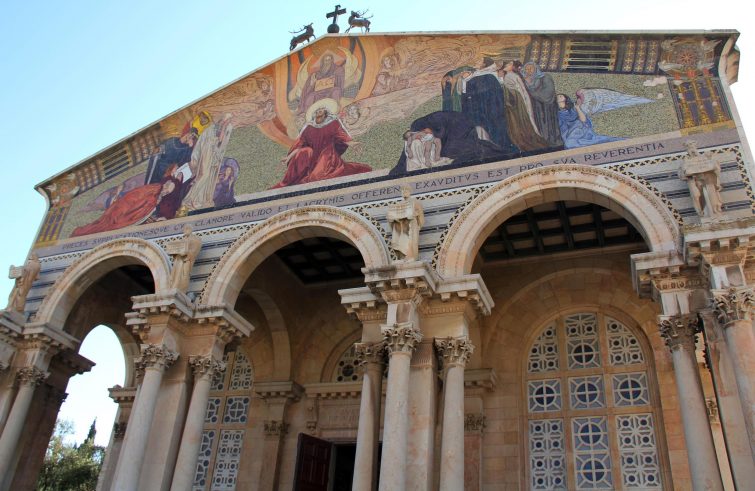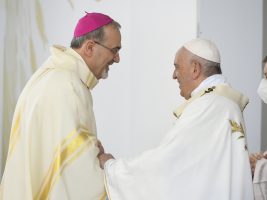
“We want to celebrate together, we want to be together, we want to see you together”: these are the words used by the Latin Patriarch of Jerusalem, Mons. Pierbattista Pizzaballa, to describe the ecumenical dialogue in the Holy Land.
This year’s Week of Prayer for Christian Unity, which in the northern hemisphere is held from 18 to 25 January, has as its theme: “We saw his star in the east, and have come to worship him” ( Matthew 2:2). The theme was selected by the Middle East Council of Churches, a land that returns to act as a focal point for ecumenism; a land marked by tensions, unresolved conflicts and ongoing wars, where overcoming divisive issues among the Churches is a daily challenge. In fact, all matters involving these differences have practical consequences in the life – not only pastoral – of the Churches. Suffice it to mention the calendar: some Churches follow the Gregorian calendar, others the Julian calendar. For this reason, the Week of Prayer for Unity in Jerusalem will be celebrated on 22 January, at the end of the Armenian Christmas season (18 January, ed.’s note).
“Living together”. Speaking from Jordan, where he is conducting a pastoral visit, Mons. Pizzaballa highlights “the Christian population’s yearning to live in peace, in harmony and good relations. In a word: to live together.” He explained: “the Holy Land and Jerusalem are ultimately a workshop of ecumenism, a reality lived in the flesh by our faithful, by our Christian families, 90% of whom are mixed, Catholic and Orthodox families. Living together ‘forces’ us to reckon with each other continuously, every day.” The Patriarch pointed out that the ecumenical narrative of the Holy Land must certainly not be confined to “the depiction of tensions in the Holy Sepulchre between the Christian Churches sharing it, broadcast on television from time to time. In fact this narrative does not reflect the reality of ecumenism in the Holy Land, which thrives on the yearning for unity of the local Christian population.” As pastor of this Church,” he added, “I must say that our faithful are earnestly voicing this plea. Wherever I go, in schools, churches, parishes, their message is:
‘We want to celebrate together, we want to be together, we want to see you together’.”
However, Pizzaballa concedes, “the population faces some difficulties with regard to ecclesiastical institutions that are somewhat rigid. History, liturgical, legal and ecclesiastical issues are a burden that the majority of the faithful finds incomprehensible. The local Christians want to be together, pray together and live as one community. This bottom-up thrust prompts the Institutions – even the most reluctant, such as the Greek Orthodox – to find compromise solutions. While liturgical and ecclesiastical unity requires a little more time, “social unity is already a fact.” Pizzaballa explains: “As Churches we are all aware that despite certain differing points we must speak with one voice with regard to the general situation in terms of politics and society. This has been especially noticeable over the past few years, as evidenced by a number of joint statements on various local issues. Indeed, this is almost always the case. The latest statement dates back to 15 December when the patriarchs and heads of the Churches in Jerusalem denounced the fact that “Christians were being targeted by Jewish radical fringe groups.”
Ecumenism and martyrdom. Mons. Pizzaballa also spoke about ecumenism and martyrdom: “We have witnessed conspicuous martyrdom in Iraq, Syria, and other Middle Eastern countries – the situation in the Holy Land is different – and it does not distinguish between the various Churches.
Persecutors see us as equals in our faith in Christ,” the Patriarch said. There is also a different kind of martyrdom. It’s the martyrdom of being a small minority in a Jewish and Islamic ‘sea’, depending on the places. This always compels us to account for who we are, and it is also what brings us Christians together.”
“It’s a constant challenge – Pizzaballa remarked – which has something to teach us as members of western societies who are eager to see the immediate results of their actions. Here in Jerusalem, however, people learn to give substance and meaning to the act of waiting. We must wait for someone else’s pace to catch up with our own. Ecumenical dialogue must be aware of this aspect that goes hand in hand with the act of listening.
Synod. “A propitious occasion for listening awaits us: the Synodal journey,” said the Patriarch, who announced a forthcoming Letter addressed to all the leaders of Christian Churches in Jerusalem, due to be published during the Week of Prayer for Christian Unity (in the Holy Land on 22 January). “In the letter I will inform them of the Synod, wherein listening is a central theme. We shall be pleased not only to inform them but also to receive their opinion on the subject of synodality. The Orthodox Churches have a wealth of experience in this regard.”












